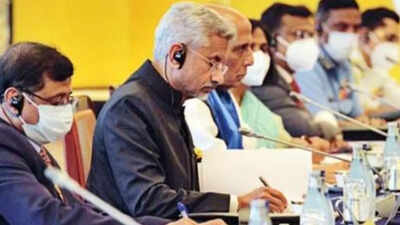Top Searches
- News
- India News
- Japan seeks stronger security ties with India at 2+2 meet, says global order is under strain
Japan seeks stronger security ties with India at 2+2 meet, says global order is under strain

S Jaishankar during the India-Japan 2+2 dialogue in Tokyo on Thursday (ANI)
NEW DELHI: China and the Ukraine situation figured prominently in the second India-Japan 2+2 ministerial dialogue which took place in Tokyo on Thursday in the middle of, as foreign minister S Jaishankar said, a complicated global environment. Japan called for stepping up security and defence cooperation with India while slamming China for unilateral attempts to change the status quo in East and South China Seas and Russia for its “invasion” of Ukraine.
The two sides reaffirmed in a joint statement, which did not specifically name Russia or China, their commitment to a rules-based global order that respects sovereignty and territorial integrity and emphasised the need for all to seek peaceful resolution of disputes in accordance with international law andwithout resorting to threat or use of force.
In remarks aimed at Russia, Japan, which has been pushing India to take a stronger position on the Ukraine issue, said in its own readout that unilateral change of status quo by force is not permitted in any region, and not just in the Indo-Pacific. The 2+2 talks happened against the backdrop of Russian military exercises with China and others on islands claimed by Japan.
Jaishankar’s counterpart Yoshimasa Hayashi described cooperation with India as important at a time, he said, the “international order faces many challenges”. Discussions were also held on North Korea and the situation in South Asia.
“If you take a look at the international community, unilateral attempts to change the status quo with force are continuing in the East and South China Seas, let alone Russia’s invasion of Ukraine,” Hayashi was quoted as saying by Reuters in Tokyo. Jaishankar himself didn’t mention Russia or Ukraine in his opening or closing remarks but said “conflicts” and climate events had further aggravated the global economic situation, creating deep anxieties in respect of energy and food security.
Jaishankar said the two countries had a particular responsibility for ensuring a free, open, inclusive and prosperous Indo-Pacific and that this was being done through a range of policies and mechanisms, including cooperation in the Quad framework and utilisation of Asean platforms. “We are two nations committed to promoting a rules-based order, ensuring respect for international law and norms, and safeguarding the globalcommons. To our endeavours in that regard are now added the necessity of creating resilient and reliable supply chains in the aftermath of the Covid pandemic,” he said, adding the two countries also discussed cooperation in cyber security, 5G deployment and critical and strategic minerals.
According to the joint statement, the ministers had a “frank and fruitful” discussion on the regional and global issues of mutual interests and concerns, particularly those in the Indo-Pacific as well as Ukraine.
As it explores “counterstrike capabilities”, the Japanese side expressed its determination to “fundamentally reinforce” Japan’s defence capabilities and to secure substantial increase of Japan’s defence budget required for it. There was a lot of focus on enhancing defence cooperation including “concrete” cooperation in the field of defence equipment and technology cooperation.
The two sides reaffirmed in a joint statement, which did not specifically name Russia or China, their commitment to a rules-based global order that respects sovereignty and territorial integrity and emphasised the need for all to seek peaceful resolution of disputes in accordance with international law andwithout resorting to threat or use of force.
In remarks aimed at Russia, Japan, which has been pushing India to take a stronger position on the Ukraine issue, said in its own readout that unilateral change of status quo by force is not permitted in any region, and not just in the Indo-Pacific. The 2+2 talks happened against the backdrop of Russian military exercises with China and others on islands claimed by Japan.
Jaishankar’s counterpart Yoshimasa Hayashi described cooperation with India as important at a time, he said, the “international order faces many challenges”. Discussions were also held on North Korea and the situation in South Asia.
“If you take a look at the international community, unilateral attempts to change the status quo with force are continuing in the East and South China Seas, let alone Russia’s invasion of Ukraine,” Hayashi was quoted as saying by Reuters in Tokyo. Jaishankar himself didn’t mention Russia or Ukraine in his opening or closing remarks but said “conflicts” and climate events had further aggravated the global economic situation, creating deep anxieties in respect of energy and food security.
Jaishankar said the two countries had a particular responsibility for ensuring a free, open, inclusive and prosperous Indo-Pacific and that this was being done through a range of policies and mechanisms, including cooperation in the Quad framework and utilisation of Asean platforms. “We are two nations committed to promoting a rules-based order, ensuring respect for international law and norms, and safeguarding the globalcommons. To our endeavours in that regard are now added the necessity of creating resilient and reliable supply chains in the aftermath of the Covid pandemic,” he said, adding the two countries also discussed cooperation in cyber security, 5G deployment and critical and strategic minerals.
According to the joint statement, the ministers had a “frank and fruitful” discussion on the regional and global issues of mutual interests and concerns, particularly those in the Indo-Pacific as well as Ukraine.
As it explores “counterstrike capabilities”, the Japanese side expressed its determination to “fundamentally reinforce” Japan’s defence capabilities and to secure substantial increase of Japan’s defence budget required for it. There was a lot of focus on enhancing defence cooperation including “concrete” cooperation in the field of defence equipment and technology cooperation.
FOLLOW US ON SOCIAL MEDIA
FacebookTwitterInstagramKOO APPYOUTUBE
Start a Conversation
end of article









